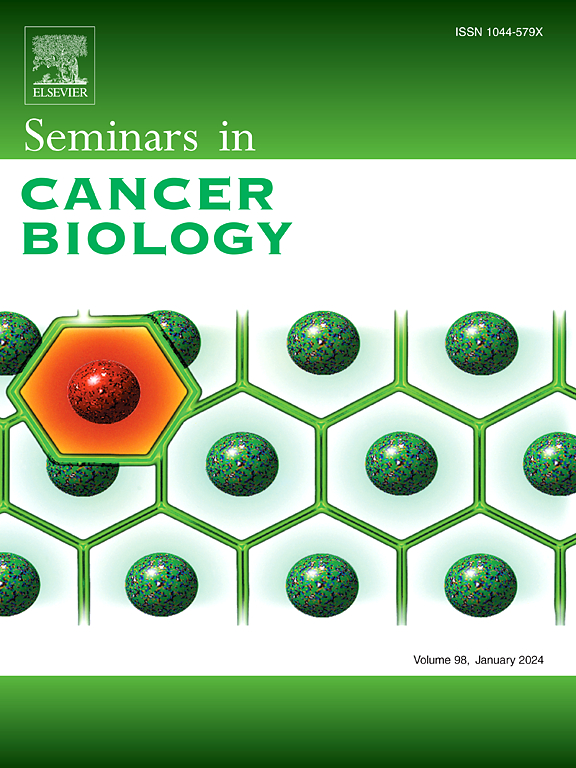The intricate role of adipokines in cancer-related signaling and the tumor microenvironment: Insights for future research
IF 12.1
1区 医学
Q1 ONCOLOGY
引用次数: 0
Abstract
Obesity represents a global health challenge, with adipose tissue acting as a highly active endocrine organ that synthesizes and secretes a diverse array of bioactive proteins, known as adipokines. These cell signaling molecules regulate metabolic equilibrium, inflammatory cascades, and immune surveillance, exerting substantial systemic effects. A growing body of evidence has also highlighted their key role in cancer biology, through their intricate impact on oncogenic signaling networks and the tumor microenvironment (TME). The TME, a highly dynamic and heterotypic network composed of malignant cells, infiltrating immune cells, stromal constituents, and extracellular matrix elements, facilitates tumor evolution and immune evasion. Among adipokines, adiponectin and leptin have been extensively studied. Research has shown that adiponectin exhibits tumor-suppressive properties, whereas leptin enhances proliferative, angiogenic, and inflammatory pathways that promote malignancy. However, these effects are context-dependent and, at times, contradictory across different studies. Furthermore, the functional landscape of adipokines in cancer extends beyond these paradigms, with emerging research identifying a broader spectrum of novel adipokines involved in cancer reprogramming. This review delineates the molecular interplay between adipokines and oncogenic pathways, elucidating their mechanistic contributions to TME crosstalk and immune modulation. Additionally, we examine their potential as diagnostic and prognostic biomarkers and assess their viability as therapeutic targets for precision oncology. By integrating current evidence and identifying unresolved questions, this review aims to refine our understanding of adipokine-driven tumor biology and establish a platform for future research.
脂肪因子在癌症相关信号和肿瘤微环境中的复杂作用:对未来研究的见解
肥胖是一个全球性的健康挑战,脂肪组织作为一个高度活跃的内分泌器官,合成和分泌多种生物活性蛋白,称为脂肪因子。这些细胞信号分子调节代谢平衡、炎症级联反应和免疫监视,发挥重要的全身作用。越来越多的证据也强调了它们在癌症生物学中的关键作用,通过它们对致癌信号网络和肿瘤微环境(TME)的复杂影响。TME是一个由恶性细胞、浸润性免疫细胞、基质成分和细胞外基质成分组成的高度动态的异型网络,促进肿瘤的进化和免疫逃逸。在脂肪因子中,脂联素和瘦素已被广泛研究。研究表明,脂联素具有抑制肿瘤的特性,而瘦素则增强了促进恶性肿瘤的增殖、血管生成和炎症途径。然而,这些影响是上下文相关的,有时在不同的研究中是相互矛盾的。此外,脂肪因子在癌症中的功能格局超出了这些范式,新兴研究发现了更广泛的新型脂肪因子参与癌症重编程。本文综述了脂肪因子与致癌途径之间的分子相互作用,阐明了它们对TME串扰和免疫调节的机制贡献。此外,我们研究了它们作为诊断和预后生物标志物的潜力,并评估了它们作为精确肿瘤学治疗靶点的可行性。通过整合现有的证据和识别尚未解决的问题,本综述旨在完善我们对脂肪因子驱动的肿瘤生物学的理解,并为未来的研究建立一个平台。
本文章由计算机程序翻译,如有差异,请以英文原文为准。
求助全文
约1分钟内获得全文
求助全文
来源期刊

Seminars in cancer biology
医学-肿瘤学
CiteScore
26.80
自引率
4.10%
发文量
347
审稿时长
15.1 weeks
期刊介绍:
Seminars in Cancer Biology (YSCBI) is a specialized review journal that focuses on the field of molecular oncology. Its primary objective is to keep scientists up-to-date with the latest developments in this field.
The journal adopts a thematic approach, dedicating each issue to an important topic of interest to cancer biologists. These topics cover a range of research areas, including the underlying genetic and molecular causes of cellular transformation and cancer, as well as the molecular basis of potential therapies.
To ensure the highest quality and expertise, every issue is supervised by a guest editor or editors who are internationally recognized experts in the respective field. Each issue features approximately eight to twelve authoritative invited reviews that cover various aspects of the chosen subject area.
The ultimate goal of each issue of YSCBI is to offer a cohesive, easily comprehensible, and engaging overview of the selected topic. The journal strives to provide scientists with a coordinated and lively examination of the latest developments in the field of molecular oncology.
 求助内容:
求助内容: 应助结果提醒方式:
应助结果提醒方式:


